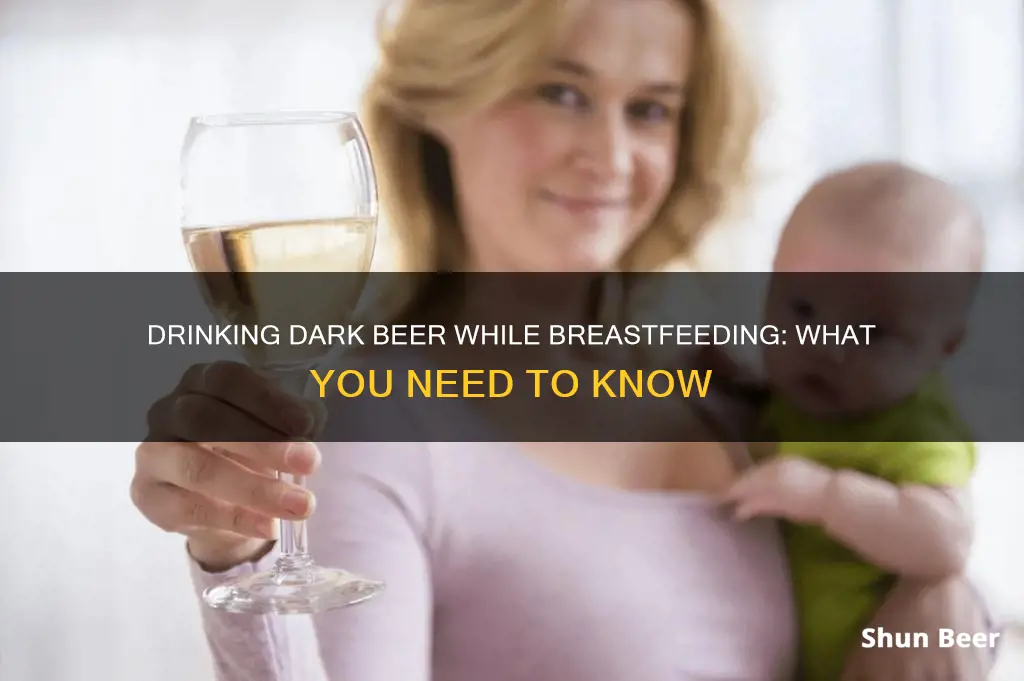
There are many opinions on whether it is safe to consume dark beer while breastfeeding. While some sources claim that it is generally safe to consume very moderate amounts of alcohol while breastfeeding, others suggest that it is best to avoid alcohol altogether. According to the Centers for Disease Control and Prevention (CDC), the safest option is to refrain from consuming any alcohol while breastfeeding. However, the CDC also notes that an occasional standard-size drink, such as 12 ounces of 5% beer, is unlikely to harm the baby. It is recommended to wait for at least two hours after drinking before breastfeeding, as alcohol can pass into breast milk and may affect the baby's sleep patterns and development.
| Characteristics | Values |
|---|---|
| Is it safe to drink dark beer while breastfeeding? | It is not recommended to consume alcohol while breastfeeding. However, drinking in moderation (one standard drink) while breastfeeding is likely fine. |
| How long should I wait after drinking dark beer before breastfeeding? | It is recommended to wait for at least 2 hours after drinking before breastfeeding or pumping. The alcohol content in breast milk is similar to blood alcohol levels and will diminish over time. |
| Does dark beer increase milk supply? | There is no scientific evidence that drinking beer or any other type of alcohol boosts milk supply. While barley, a component of beer, may increase prolactin levels, the alcohol in beer interferes with the oxytocin release necessary for milk production. |
| Are there any risks associated with drinking dark beer while breastfeeding? | Excessive alcohol consumption can impact the baby's sleep patterns and growth/development. It can also lead to long-term consequences for the baby's development. |
| What are some alternatives to drinking dark beer while breastfeeding? | Alcohol-free beer, non-alcoholic drinks, or other types of drinks in moderation are recommended. |
What You'll Learn

How much alcohol is safe for a breastfeeding mother?
While it is advised that breastfeeding mothers avoid alcohol altogether, an occasional drink is unlikely to harm your baby, especially if you wait at least 2 hours after drinking before feeding. It is important to keep in mind that alcohol can pass into your breast milk and then into your baby when you feed them.
The alcohol level in breast milk is essentially the same as the alcohol level in a mother's bloodstream. Alcohol levels in breast milk are usually highest 30 to 60 minutes after drinking, though eating food can delay this peak. Generally, alcohol can be detected in breast milk for about 2 to 3 hours per drink consumed. The more alcohol a mother consumes, the longer it can be detected in her breast milk. For example, alcohol from 2 drinks can be detected for about 4 to 5 hours, while alcohol from 3 drinks can be detected for about 6 to 8 hours.
To keep health risks from alcohol to a low level, it is recommended that breastfeeding mothers should not drink more than 14 units a week on a regular basis. Fourteen units of alcohol are equivalent to 6 pints of average-strength beer. If you regularly drink more than this amount, it is advisable to discuss it with your health visitor or GP.
If you intend to have an alcoholic drink, you can try avoiding breastfeeding for 2 to 3 hours per drink to avoid exposing your baby to any alcohol in your milk. This allows time for the alcohol to leave your breast milk. You can plan ahead by expressing some milk before drinking, so you can feed your baby with the expressed milk instead. However, it is important to note that your breasts may become uncomfortably full if you leave long gaps between feeds, and you may feel the need to express for comfort.
Corn Syrup in Beer: Does It Work?
You may want to see also

Does alcohol affect breast milk production?
Alcohol does indeed affect breast milk production. While the barley in beer contains a polysaccharide that increases prolactin production, which in turn stimulates breast milk production, alcohol on its own decreases milk production. Alcohol inhibits the release of oxytocin, which stimulates milk ejection. The higher the alcohol intake, the greater the effect. One study found that drinking as little as 0.3 g of alcohol per kg (less than the amount considered acceptable by the American Academy of Pediatrics) reduced milk production by about 10%.
Several studies have found that infants breastfed by women who had consumed alcohol prior to nursing consumed approximately 20% less milk in the first 4 hours after maternal alcohol consumption than infants of women who did not drink. However, a subsequent study reported that if mothers did not consume any more alcohol, babies breastfed more frequently and consumed larger amounts of milk in the 8 to 12 hours after maternal alcohol consumption.
It is worth noting that the effects of alcohol on breast milk production are short-lived. Once the mother is "sober," supply levels return to normal.
Weed Beer: How Does It Work?
You may want to see also

How long after drinking alcohol should you wait to breastfeed?
While the safest option while breastfeeding is to avoid alcohol altogether, one standard alcoholic drink per day is likely fine. If you do choose to drink alcohol, it is important to wait at least two hours after drinking before breastfeeding or pumping. This will allow your body to metabolise the alcohol and reduce the amount passed to the baby through breast milk. It is worth noting that alcohol can negatively impact your baby's sleep patterns and may cause them to sleep less, even if they seem sleepier.
The time it takes to metabolise alcohol varies from person to person and depends on factors such as age, biological sex, body weight, food consumption, and drinking speed. On average, the human body metabolises one standard alcoholic drink per hour. This means that a pint of beer will take roughly two hours to metabolise, and a large glass of wine will take about three hours.
If you are intoxicated, you should avoid breastfeeding until you are sober. It is also important to ensure that you have appropriate childcare arrangements in place if you plan to drink. Additionally, consider storing extra breast milk so that you don't have to worry about feeding your baby before the alcohol has cleared from your system.
Drinking Beer at Dollywood: What You Need to Know
You may want to see also

What is the best type of beer to drink while breastfeeding?
While breastfeeding, it is best to avoid drinking alcohol altogether. The Centers for Disease Control and Prevention (CDC) recommends that breastfeeding mothers abstain from alcohol consumption. However, if you do choose to drink, it is important to drink in moderation and wait at least two hours after consuming one alcoholic beverage before breastfeeding or pumping.
If you are looking for a beer to drink while breastfeeding, it is important to consider the alcohol content. A standard drink is typically defined as 12 ounces of 5% ABV beer, which is about the amount in one bottle or can. Beer varies in alcohol content, ranging from about 4% to 7% ABV, so it is important to pay attention to the percentage. For example, a 9% ABV beer counts as two drinks.
When it comes to the type of beer, there is no specific type that is better than others while breastfeeding. However, it is important to choose a beer with a lower alcohol content to stay within the recommended limits. Some people recommend drinking non-alcoholic beer, as it provides the potential milk supply-enhancing benefits of barley without the negative effects of alcohol.
It is worth noting that the belief that beer increases milk supply is not supported by research. While barley can boost prolactin production, the alcohol in beer decreases milk production and inhibits the milk ejection reflex. Additionally, alcohol can have negative effects on your baby's sleep patterns and development, and regular alcohol consumption can lead to a lower milk supply and delayed let-down reflex.
Beer and Antibiotics: Is it Safe to Drink with Amoxi Clav?
You may want to see also

What are the risks of drinking alcohol while breastfeeding?
While it is advised to cut out drinking alcohol completely while breastfeeding, drinking in moderation is likely fine. According to the Centers for Disease Control and Prevention (CDC), it is best to wait for at least two hours after drinking before breastfeeding. This is because alcohol does pass into your breast milk and can have several effects on your baby.
Firstly, excessive alcohol consumption can impact your baby's sleep patterns and growth/development. In the short term, you may notice that your baby doesn't sleep as well after you've had alcohol. This is due to impaired REM sleep and increased startling/arousal. There may also be long-term implications for your baby's development, but more research is needed to confirm this.
Secondly, drinking alcohol while breastfeeding can affect your milk supply. While some sources claim that the barley in beer can boost prolactin production, the alcohol component decreases milk production and inhibits the milk ejection reflex. A 2001 study found that babies consumed 20% less breast milk during the first four hours after their mothers had consumed alcohol, despite spending a similar amount of time on the breast.
Thirdly, drinking alcohol can have potential long-term effects on your child's cognitive development. A 2018 study showed that 6- and 7-year-old children who had been exposed to alcohol in their mother's milk as babies didn't score as well on reasoning tests as their peers who hadn't been exposed.
Therefore, while an occasional drink is probably safe, it is important to drink responsibly and wait at least two hours after drinking before breastfeeding to minimise any potential risks to your baby.
Antibiotics and Alcohol: A Risky Mix?
You may want to see also
Frequently asked questions
It is not recommended to consume alcohol while breastfeeding. However, if you do choose to drink, it is best to wait for at least two hours after drinking before breastfeeding or pumping.
It is recommended to limit alcohol consumption to one drink per day. One drink is typically considered to be 12 ounces of 5% ABV beer (approximately one bottle).
While some ingredients in beer may increase prolactin levels, which aid in milk production, the alcohol in beer interferes with the oxytocin release necessary for breast milk letdown. Therefore, beer is not considered a galactagogue.
Drinking alcohol while breastfeeding can have negative effects on the baby's development and weight gain. It can also disrupt the baby's sleep patterns. Additionally, regular alcohol consumption can negatively impact the let-down reflex, resulting in the baby receiving less milk.







